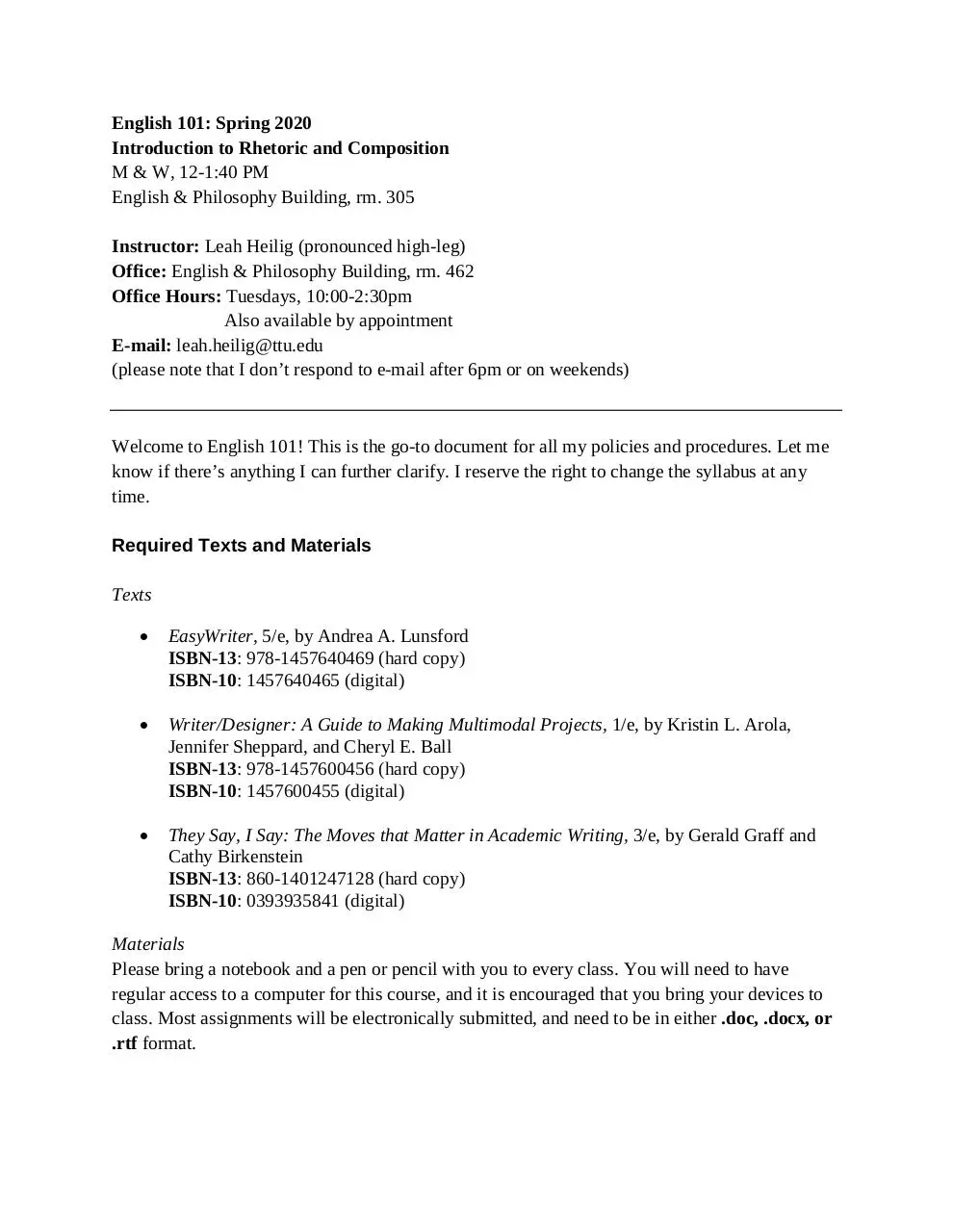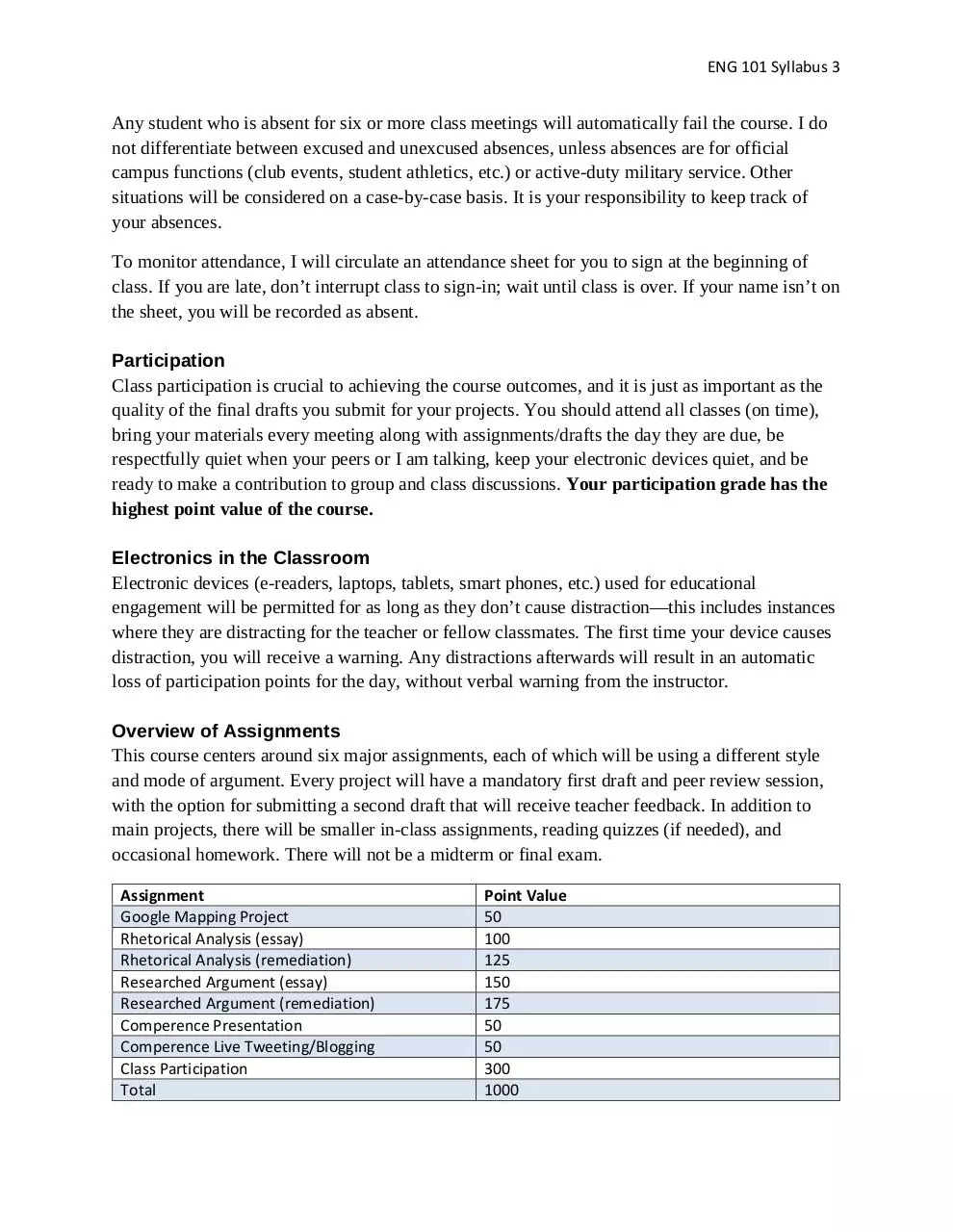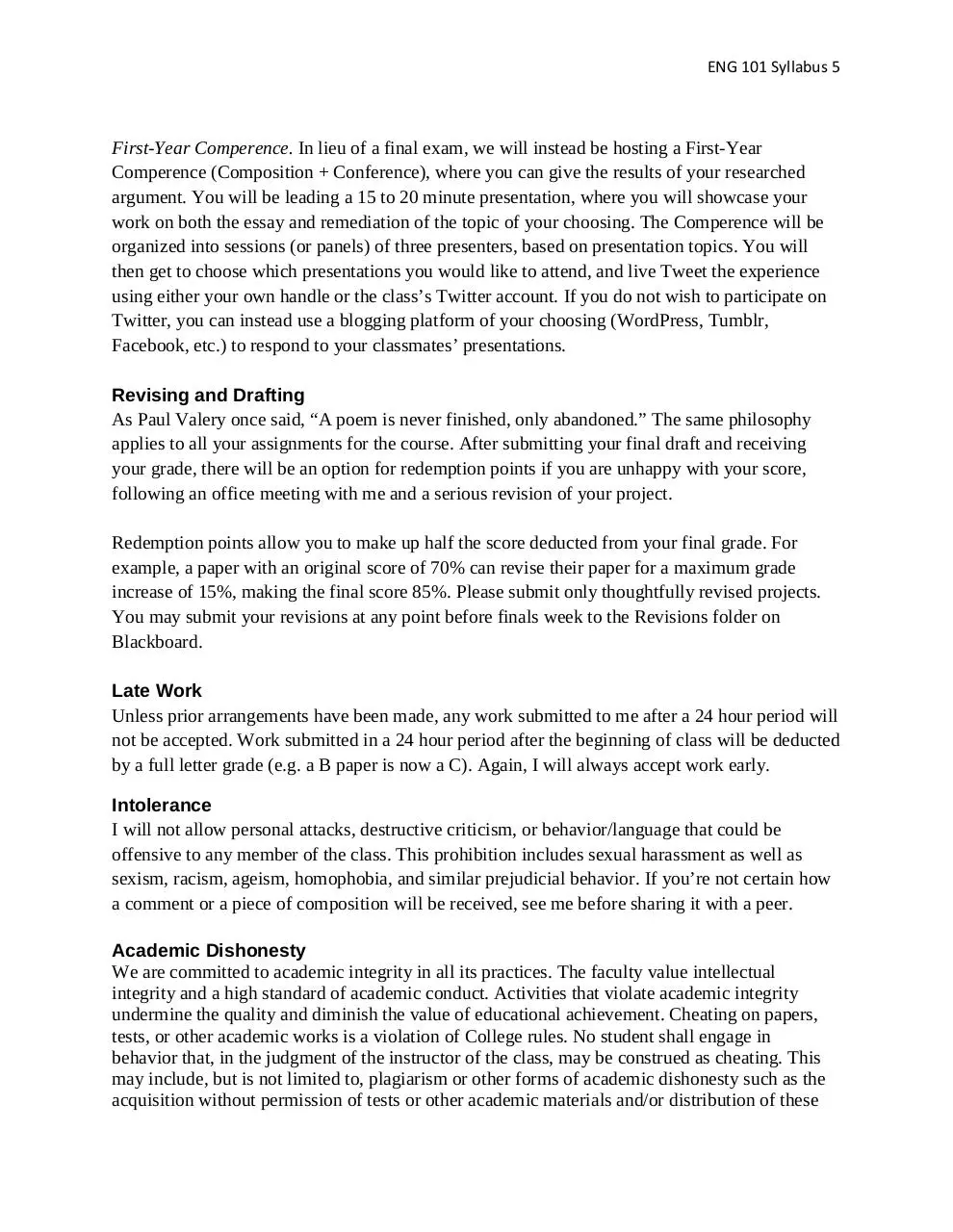Heilig5060Syllabus Accessible (PDF)
File information
Title: English 101 Syllabus
Author: Leah Heilig
This PDF 1.6 document has been generated by Acrobat PDFMaker 11 for Word / Adobe PDF Library 11.0, and has been sent on pdf-archive.com on 11/11/2015 at 00:33, from IP address 129.118.x.x.
The current document download page has been viewed 1005 times.
File size: 116.63 KB (7 pages).
Privacy: public file





File preview
English 101: Spring 2020
Introduction to Rhetoric and Composition
M & W, 12-1:40 PM
English & Philosophy Building, rm. 305
Instructor: Leah Heilig (pronounced high-leg)
Office: English & Philosophy Building, rm. 462
Office Hours: Tuesdays, 10:00-2:30pm
Also available by appointment
E-mail: leah.heilig@ttu.edu
(please note that I don’t respond to e-mail after 6pm or on weekends)
Welcome to English 101! This is the go-to document for all my policies and procedures. Let me
know if there’s anything I can further clarify. I reserve the right to change the syllabus at any
time.
Required Texts and Materials
Texts
• EasyWriter, 5/e, by Andrea A. Lunsford
ISBN-13: 978-1457640469 (hard copy)
ISBN-10: 1457640465 (digital)
• Writer/Designer: A Guide to Making Multimodal Projects, 1/e, by Kristin L. Arola,
Jennifer Sheppard, and Cheryl E. Ball
ISBN-13: 978-1457600456 (hard copy)
ISBN-10: 1457600455 (digital)
• They Say, I Say: The Moves that Matter in Academic Writing, 3/e, by Gerald Graff and
Cathy Birkenstein
ISBN-13: 860-1401247128 (hard copy)
ISBN-10: 0393935841 (digital)
Materials
Please bring a notebook and a pen or pencil with you to every class. You will need to have
regular access to a computer for this course, and it is encouraged that you bring your devices to
class. Most assignments will be electronically submitted, and need to be in either .doc, .docx, or
.rtf format.
ENG 101 Syllabus 2
Course Description
English 101 introduces students to the theory, principles, and processes of effective written and
digital communication. Emphasis is placed upon critical thinking, analytical reading and writing,
multi-modal composition, digital literacy, and student-to-student evaluation of arguments. This
semester, English 101, section 056, will meet for 16 weeks on Mondays and Wednesdays from
12:00 to 1:40 pm in English and Philosophy rm. 305.
Course Objectives
By the end of the course, students of ENG 101 should:
Improve rhetorical sophistication by learning to make choices as composers and by developing
their abilities
• to discern different situations, aims, and purposes in composition
• to use different modes of inquiry, development, and presentation in composition
• to modulate their voices, diction, and style according to different rhetorical situations
• to develop in points, judgments and critical perspectives coherently with appropriate
support and evidence
• to respond to, evaluate, and revise their own and others’ composition
Develop their abilities to engage critically with various kinds of discourses, texts, and
information learning
• to describe, summarize, and analyze discourse, texts, and information accurately
• to develop critical strategies for researching, evaluating, interpreting, and documenting
various discourse, texts, and information
• to use researched material for support and evidence in analytical and rhetorical
composition
Acquire digital literacy skills, allowing students to
• use a variety of technology tools to collaborate, compose, and revise
• use a variety of digital and multimedia sources critically
• understand that images, sounds, and animations—in addition to words—constitute the
building blocks of 21st century communication
In addition to developing skills and abilities in reading, writing, digital literacy, and critical
thinking, students will learn how language informs or affects our understanding of human values,
cultural perspectives or interrelatedness of disciplines.
Attendance
It is important that you attend every class meeting. If you are absent from class, you are still
accountable for assignment deadlines, will earn no participation points for that day, and will have
no opportunity to make up those points. Students will be counted absent if they arrive later than
twenty minutes after the start of class.
ENG 101 Syllabus 3
Any student who is absent for six or more class meetings will automatically fail the course. I do
not differentiate between excused and unexcused absences, unless absences are for official
campus functions (club events, student athletics, etc.) or active-duty military service. Other
situations will be considered on a case-by-case basis. It is your responsibility to keep track of
your absences.
To monitor attendance, I will circulate an attendance sheet for you to sign at the beginning of
class. If you are late, don’t interrupt class to sign-in; wait until class is over. If your name isn’t on
the sheet, you will be recorded as absent.
Participation
Class participation is crucial to achieving the course outcomes, and it is just as important as the
quality of the final drafts you submit for your projects. You should attend all classes (on time),
bring your materials every meeting along with assignments/drafts the day they are due, be
respectfully quiet when your peers or I am talking, keep your electronic devices quiet, and be
ready to make a contribution to group and class discussions. Your participation grade has the
highest point value of the course.
Electronics in the Classroom
Electronic devices (e-readers, laptops, tablets, smart phones, etc.) used for educational
engagement will be permitted for as long as they don’t cause distraction—this includes instances
where they are distracting for the teacher or fellow classmates. The first time your device causes
distraction, you will receive a warning. Any distractions afterwards will result in an automatic
loss of participation points for the day, without verbal warning from the instructor.
Overview of Assignments
This course centers around six major assignments, each of which will be using a different style
and mode of argument. Every project will have a mandatory first draft and peer review session,
with the option for submitting a second draft that will receive teacher feedback. In addition to
main projects, there will be smaller in-class assignments, reading quizzes (if needed), and
occasional homework. There will not be a midterm or final exam.
Assignment
Google Mapping Project
Rhetorical Analysis (essay)
Rhetorical Analysis (remediation)
Researched Argument (essay)
Researched Argument (remediation)
Comperence Presentation
Comperence Live Tweeting/Blogging
Class Participation
Total
Point Value
50
100
125
150
175
50
50
300
1000
ENG 101 Syllabus 4
Final grades will be calculated according to a standard, shaded grading scale (i.e. A-, A, A+). For
each major assignment, you will be able to see the rubric used for assessment. Should you ever
want to contest a grade, please set up an appointment with me through e-mail.
Schedule and Descriptions for Assignments
Schedule for All Major Assignments
Assignment
Google Mapping Project
Rhetorical Analysis (essay)
Rhetorical Analysis (remediation)
Researched Argument (essay)
Researched Argument (remediation)
First-Year Comperence
Week Assigned
1
3
6
9
11
14
Week Due*
3
6
9
11
14
Finals
*All assignments must be submitted to Blackboard by Friday at midnight the week they are due
Brief Assignment Descriptions
All projects will have more detailed assignment sheets and an assessment rubric available to you on the course’s Blackboard.
Google Mapping Project. For this project, you will use Google Maps to write a visual and textual
map focusing on a theme of your choice for either the TTU campus, a place in your hometown,
or a sample neighborhood of Lubbock. Suggestions: best bicycle trails, best parkour locations,
best pubs, worst restaurants, worst traffic, etc.
Rhetorical Analysis. For this assignment, you will rhetorically analyze the promotional materials
for one campus or vocational organization. You will analyze the materials for their purpose,
context, exigency, audience, rhetorical appeals, and design, as well as determine their overall
effectiveness. These materials can take the shape of a brochure, web page, job posting,
presentations, or other documentation.
Researched Arguments. For this assignment, you will write a proposal argument that attempts to
solve a local problem. This researched argument will be a formal essay around 1500 words, and
must incorporate at least six sources, three of which should be scholarly. You will be presenting
your proposal and its remediation during the First-Year Comperence.
Remediations. Following the completion of your rhetorical analysis and your researched
argument, you will then remediate your essay into another mode of composition. You will also
be asked to write a brief (200 words) statement about the process of transforming your text.
Consider carefully what type of text will be the most effective for your content. Suggestions:
Prezi, website, social media account, podcast, video, artwork, photography, blog, poster,
Pinterest board, hypertext, playlist, etc.
ENG 101 Syllabus 5
First-Year Comperence. In lieu of a final exam, we will instead be hosting a First-Year
Comperence (Composition + Conference), where you can give the results of your researched
argument. You will be leading a 15 to 20 minute presentation, where you will showcase your
work on both the essay and remediation of the topic of your choosing. The Comperence will be
organized into sessions (or panels) of three presenters, based on presentation topics. You will
then get to choose which presentations you would like to attend, and live Tweet the experience
using either your own handle or the class’s Twitter account. If you do not wish to participate on
Twitter, you can instead use a blogging platform of your choosing (WordPress, Tumblr,
Facebook, etc.) to respond to your classmates’ presentations.
Revising and Drafting
As Paul Valery once said, “A poem is never finished, only abandoned.” The same philosophy
applies to all your assignments for the course. After submitting your final draft and receiving
your grade, there will be an option for redemption points if you are unhappy with your score,
following an office meeting with me and a serious revision of your project.
Redemption points allow you to make up half the score deducted from your final grade. For
example, a paper with an original score of 70% can revise their paper for a maximum grade
increase of 15%, making the final score 85%. Please submit only thoughtfully revised projects.
You may submit your revisions at any point before finals week to the Revisions folder on
Blackboard.
Late Work
Unless prior arrangements have been made, any work submitted to me after a 24 hour period will
not be accepted. Work submitted in a 24 hour period after the beginning of class will be deducted
by a full letter grade (e.g. a B paper is now a C). Again, I will always accept work early.
Intolerance
I will not allow personal attacks, destructive criticism, or behavior/language that could be
offensive to any member of the class. This prohibition includes sexual harassment as well as
sexism, racism, ageism, homophobia, and similar prejudicial behavior. If you’re not certain how
a comment or a piece of composition will be received, see me before sharing it with a peer.
Academic Dishonesty
We are committed to academic integrity in all its practices. The faculty value intellectual
integrity and a high standard of academic conduct. Activities that violate academic integrity
undermine the quality and diminish the value of educational achievement. Cheating on papers,
tests, or other academic works is a violation of College rules. No student shall engage in
behavior that, in the judgment of the instructor of the class, may be construed as cheating. This
may include, but is not limited to, plagiarism or other forms of academic dishonesty such as the
acquisition without permission of tests or other academic materials and/or distribution of these
ENG 101 Syllabus 6
materials and other academic work. This includes students who aid and abet as well as those who
attempt such behavior. Please review Department of English "Ethics in English: A Guide for
Students."
Accommodation
We seek to provide effective services and accommodations for qualified individuals with
documented disabilities. Any student who, because of a disability, may require special
arrangements in order to meet the course requirements should contact the instructor as soon as
possible to make any necessary arrangements. Students should present appropriate verification
from Student Disability Services during the instructor's office hours. Please note: instructors are
not allowed to provide classroom accommodations to a student until appropriate verification
from Student Disability Services has been provided. For additional information, please contact
Student Disability Services in West Hall or call 806.742.2405. See also the TTU Department of
English Emergency Action Plan in case of fire, bomb threat, flood, tornado, or active
shooter/armed subject emergency.
Also, if you are an active member of the military and are called for deployment (locally or
abroad), please contact me as soon as possible so we can make appropriate accommodations.
Student Responsibility and Self-Care
I expect each student in English 101 to be responsible for their own learning. That means reading
assignments before coming to class, asking questions about material you read but don’t
understand, inquiring about your grade during the semester, and meeting with me to discuss
problems as early as possible.
Additionally, it is important to me that you are aware of your own well-being (physical, mental,
emotional) throughout the course of the semester. Please let me know right away if you find the
course challenging, the workload difficult to manage, or are experiencing any other obstacles
related to the class. The sooner you meet with me, the sooner we can work together to find a
solution. I will do whatever I can to help you achieve the course outcomes. Also, if you draw a
shark on your policy contract, I will award you five points of extra credit.
Campus Resources
University Writing Center can help you with your written work
Tutoring services
TTU’s time management tips
Counseling services
Make use of office hours & appointments
ENG 101 Syllabus 7
Works Cited
Arola, Kristin L., Jennifer Sheppard, and Cheryl E. Ball. Writer/designer: A Guide to Making
Multimodal Projects. Boston: Bedford/St. Martin’s. 2014. Print.
Bizzell, Patricia. "Contact Zones" and English Studies." College English (1994): 163-169
"Blugold Seminar, UW-Eau Claire." Blugold Seminar, UW-Eau Claire. University of Wisconsin, n.d.
Web. 26 Sept. 2015.
Bruffee, Kenneth A. "Collaborative learning and the" conversation of mankind.” College
English (1984): 635-652.
Ede, Lisa, and Andrea Lunsford. "Audience addressed/audience invoked: The role of audience in
composition theory and pedagogy." College composition and communication (1984): 155-171.
Elbow, Peter. "Inviting the Mother Tongue: Beyond" Mistakes,"" Bad English," and" Wrong
Language"." JAC (1999): 359-388.
"English 191: Introduction to Rhetorical and Analytical Writing." St. Cloud State University. N.p., n.d.
Web. 22 Oct. 2015.
Folk, Moe. "You Are Here: Negotiating Digital Writing in FYC with Google Maps." Web 2.0
Applications for Composition Classrooms. By Claire Lutkewitte. 41-55. 2012. Print.
Graff, Gerald, and Cathy Birkenstein. They Say / I Say: The Moves That Matter in Academic Writing.
New York: W.W. Norton, 2010. Print.
Lunsford, Andrea A., Paul Kei. Matsuda, and Christine M. Tardy.Easywriter. Boston: Bedford/St.
Martin's, 2014. Print.
Selfe, Cynthia L. "Technology and Literacy: A Story about the Perils of Not Paying Attention." College
Composition and Communication 50.3 (1999): 411. Web.
Sommers, Nancy. "Revision strategies of student writers and experienced adult writers." College
Composition and Communication (1980): 378-388.
Wells, Susan. "Rogue Cops and Health Care: What Do We Want from Public Writing?" College
Composition and Communication 47.3 (1996): 325. Web.
Yancey, Kathleen Blake. “Made Not Only in Words: Composition in a New Key.” College Composition
and Communication; Dec 2004; 56, 2; ProQuest Direct Complete. 297.
Download Heilig5060Syllabus Accessible
Heilig5060Syllabus Accessible.pdf (PDF, 116.63 KB)
Download PDF
Share this file on social networks
Link to this page
Permanent link
Use the permanent link to the download page to share your document on Facebook, Twitter, LinkedIn, or directly with a contact by e-Mail, Messenger, Whatsapp, Line..
Short link
Use the short link to share your document on Twitter or by text message (SMS)
HTML Code
Copy the following HTML code to share your document on a Website or Blog
QR Code to this page

This file has been shared publicly by a user of PDF Archive.
Document ID: 0000314074.